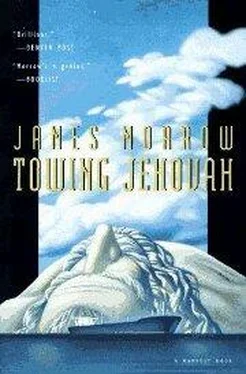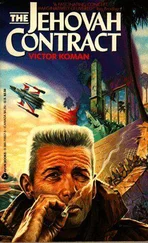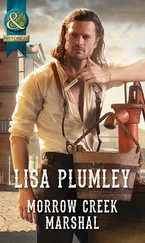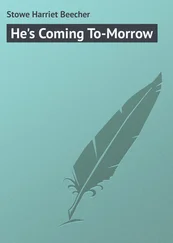Towing Jehovah
by James Morrow
WE HAVE LEFT the land and have embarked. We have burned our bridges behind us — indeed, we have gone farther and destroyed the land behind us. Now, little ship, look out! Beside you is the ocean: to be sure, it does not always roar, and at times it lies spread out like silk and gold and reveries of graciousness. But hours will come when you will realize that it is infinite and that there is nothing more awesome than infinity! Oh, the poor bird that felt free and now strikes the wall of this cage! Woe, when you feel homesick for the land as if it had offered more freedom — and there is no longer any “land.”
—Friedrich Nietzsche, “In the Horizon of the Infinite,”
The Gay Science
And the Lord said, “Behold … I will take away mine hand, and thou shalt see my back parts: but my face shall not be seen.”
—
The Book of Exodus
To the memory of my father-in-law, Albert L. Pierce
I OWE A SINGULAR debt to my friend Able Seaman Gigi Marino, a splendid writer who taught me everything I wanted to know about oil tankers. The insights of my editor, John Radziewicz, were likewise invaluable, as was the support of my agent, Merrilee Heifetz. Throughout the composing process, I maintained close contact with many friends, colleagues, and relatives, probing them for their reactions to particular scenes as well as for their general views on theothanatology. Each of the following people will know the special reasons for which I am grateful to him or her: Joe Adamson, Linda Barnes, Deborah Beale, Lynn Crosson, Shira Daemon, Sean Develin, Travis DiNicola, Daniel Dubner, Margaret Duda, Gregory Feeley, Justin Fielding, Robert Hatten, Michael Kandel, Glenn Morrow, Jean Morrow, Elisabeth Rose, Joe Schall, Peter Schneeman, D. Alexander Smith, Kathryn Smith, James Stevens-Arce, and Judith Van Herik. And, finally, a hearty thanks to the Sycamore Hill Writers’ Conference for improving the Eucharist.
THE IRREDUCIBLE STRANGENESS of the universe was first made manifest to Anthony Van Horne on his fiftieth birthday, when a despondent angel named Raphael, a being with luminous white wings and a halo that blinked on and off like a neon quoit, appeared and told him of the days to come.
That year, 1992, Anthony’s Sundays were always the same. At four P.M. he would descend into the New York subway system, take the A-train north to 190th Street, hike across the rocky hills of Fort Tryon Park, and, after melding with the tourists, enter the simulated European monastery known as the Cloisters and slip behind the altar in the Fuentiduena Chapel. There he would wait, holding his breath and enduring his migraine, until the crowd went home.
The lead-off watchman, a rangy Jamaican with a limp, always made his rounds faithfully, but at midnight a new guard normally came on duty, an emaciated N.Y.U. student who made no rounds but instead entered the Unicorn Tapestries Room bearing an aquamarine nylon backpack jammed with textbooks. After seating himself on the cold stone floor, the student would switch on his flashlight and begin poring over his Gray’s Anatomy, endlessly rehearsing the parts of the human body. “Gluteus medius, gluteus medius, gluteus medius,” he would chant into the sacred precincts. “Rectus femoris, rectus femoris, rectus femoris.”
That particular midnight, Anthony followed his usual custom. He stole out from behind the Fuentiduena altar, checked on the student (hard at work, drilling himself in the fissures and sulci of the left cerebral hemisphere), then proceeded along an arcade of Romanesque columns capped by snarling gargoyles and down a flagstone path to the gushing marble fountain that dominated the open-air Saint-Michel-de-Cuxa Cloister. Reaching into his freshly washed chinos, Anthony removed a translucent plastic box and set it on the ground. He climbed out of his pants, then pulled off his white cotton jersey, immaculate undershirt, spotless Jockey shorts, polished shoes, and clean socks. At last he stood naked in the hot night, his skin burnished by an orange moon drifting across the sky like a huge orbiting pumpkin.
“Sulcus frontalis superior, sulcus frontalis superior, sulcus frontalis superior,” said the student.
Anthony picked up the plastic box, popped the lid, and removed the egg-shaped cake. Pressing the soap against his chest, he leaned into the Cuxa fountain. In the golden pool he saw himself — the broken nose, the weary eyes sinking into bogs of flesh, the high forehead eroded by sea spray and baked hard by equatorial sun, the tangled gray beard spreading across a lantern jaw. He lathered up, letting the cake slide down his arms and chest like a tiny toboggan, catching it before it hit the flagstones.
“Sulcus praecentralis, sulcus praecentralis, sulcus praecentralis…”
Ivory soap, mused Anthony as he rinsed, Procter and Gamble at its purest. At that exact moment he felt clean — though the oil, he knew, would be back the next day. The oil always came back. For what soap on earth could scrub away the endless black gallons that had spilled from the fractured hull of the SS Carpco Valparaíso, what caliber of purity could erase that particular stain?
During the cold months, Anthony had kept a Turkish bath towel handy, but now it was mid-June — the first day of summer, in fact — and a simple jog through the museum would be sufficient to get him dry. And so he put on his Jockey shorts and ran, moving past the Pontaut Chapter House… the Nine Heroes Tapestries Room… Robert Campin Hall with its homey Annunciation: the angel Gabriel advising Mary of God’s intentions as she sits in the bourgeois parlor of the artist’s patrons, surrounded by tokens of her innocence — fresh lilies, white candle, gleaming copper kettle.
At the entry to the Langon Chapel, beneath a rounded arch set on lintels carved with blooming acanthus, a sixtyish man in a flowing white robe stood weeping.
“No,” he moaned, his low, liquid sobs echoing off the limestone. “No…”
Except for the man’s wings, Anthony might have assumed the intruder was a penitent like himself. But there they were, huge and phosphorescent, sprouting from his shoulder blades in all their feathered improbability.
“No…”
The glowing man looked up. A halo hovered above his snowy hair, flashing bright red: on-off, on-off, on-off. His eyes were rheumy and inflamed. Silver droplets rolled from his tear ducts like beads of liquid mercury.
“Good evening,” said the intruder, convulsively catching his breath. He laid his hand on his cheek and, like a blotter pressed against some infinitely sad letter, his palm absorbed the tears. “Good evening and happy birthday, Captain Van Horne.”
“You know me?”
“This is not a chance meeting.” The intruder’s voice was wavering and fragmented, as if he were speaking through the whirling blades of an electric fan. “Your schedule is well known among us angels — these secret visits to the fountain, these sly ablutions…”
“Angels?”
“Call me Raphael.” The intruder cleared his throat. “Raphael Azarias.” His skin, yellow aspiring to gold, shone in the moonlight like a brass sextant. He smelled of all the succulent wonders Anthony had ever sampled on his journeys, of papayas and mangoes, guanabanas and tamarinds, guavas and guineppes. “For I am indeed the celebrated archangel who vanquished the demon Asmodeus.”
A winged man. Robed, haloed, delusions of divinity: another New York lunatic, Anthony surmised. And yet he did not resist when the angel reached out, wrapped five frigid fingers around his wrist, and led him back to the Cuxa fountain.
Читать дальше












